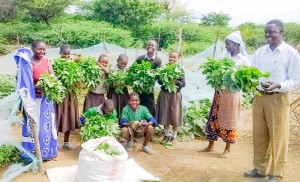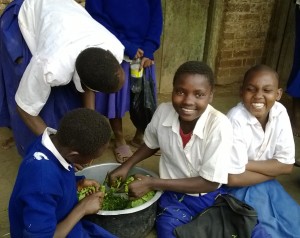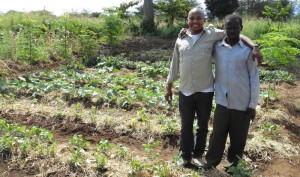Tupendane Garden Shop, Tanzania
partners with schools, leaders, and families to implement programs including school breakfast, Water, Sanitation, and Hygiene Infrastructure projects, and home organic vegetable gardens.
Stories Donation Opportunities
Partner Since: 2009
Partner Schools: 7
WASH Infrastructure Projects: 14
2013-2014 School Meals Provided: 770,476
School Gardens Built: 6
Family Loans Disbursed: 3
Family Gardens Built: 108
Programs
Organic Vegetable Gardens
Tupendane has partnered with six local primary schools to implement FAITH Organic Vegetable Gardens for families in Kahe Ward. School gardens and compost production-lines provide hands-on learning opportunities for students. They also help
Tupendane identify children who will benefit most from family vegetable gardens at home. Every two weeks Tupendane works with three new families to open home vegetable gardens.
School WASH Infrastructure
Tupendane partners with primary schools in Kahe Ward to implement Water, Sanitation, and Hygiene (WASH) Infrastructure projects. These projects include toilets, kitchens, water connections, and hand-washing basins at the  schools. Sufficient WASH Infrastructure increases school attendance by reducing illness. It also enables schools to start breakfast programs that require clean cooking spaces and sanitation facilities.
schools. Sufficient WASH Infrastructure increases school attendance by reducing illness. It also enables schools to start breakfast programs that require clean cooking spaces and sanitation facilities.
School Breakfast
Ensuring that students begin their school day with a full stomach and energy to learn is one of the most effective ways to improve student performance and long-term achievement. Tupendane mills a breakfast flour that is formulated with a mix of fatty amino acids and proteins to improve brain functions. The breakfast program is implemented at schools using a declining subsidy model that encourages parents to gradually increase their contributions to student breakfast.
Community
Tupendane works in Kahe – a group of rural wards in the Moshi Rural District of Tanzania, at the base of Mount Kilimanjaro. Most of the 28,000 residents depend on harvests of sugar, corn, or maize for income. Challenges in the community include extreme weather conditions – hot dry stretches followed by flood rains – and land that is declining in productivity. Additionally, markets are poorly organized, making it difficult to sell produce for good prices. FAITH Gardens help families to diversify their crops and generate continuous harvests. WASH Infrastructure and breakfast feeding ensures children get the nutrition they need to focus on school work and develop healthy brains and bodies.

